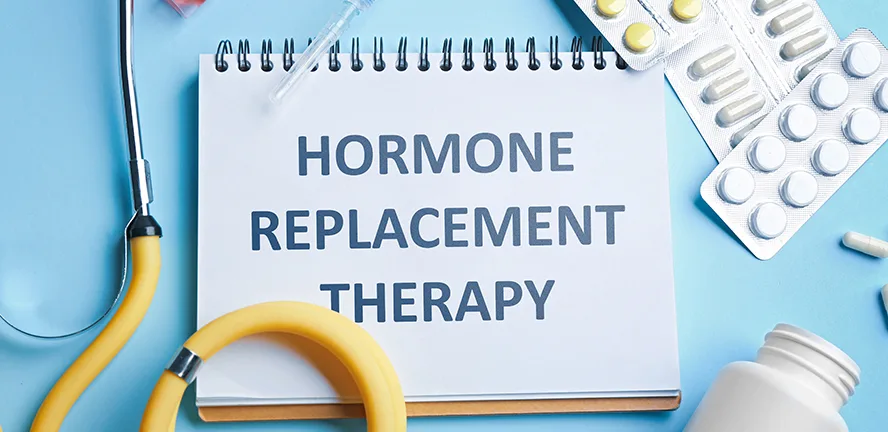
As women age, their bodies undergo several changes, including decreased hormone production. For women who have experienced menopause, this can lead to uncomfortable symptoms such as hot flashes, mood swings, and sleep disturbances. Hormone replacement therapy, also known as HRT, is a treatment that can help alleviate these symptoms by supplementing the body’s declining hormone levels.
Understanding HRT and Its Purpose
Hormone Replacement Therapy (HRT) is a medical treatment that uses hormones to replace the ones that the body no longer produces after menopause. HRT can help alleviate symptoms associated with menopause, such as hot flashes, night sweats, vaginal dryness, and mood swings. In addition, it can also help prevent osteoporosis and other health problems associated with menopause.

What Is HRT
Hormone replacement therapy (HRT) is a treatment that involves the use of estrogen and progesterone, which are hormones that the body naturally produces. Estrogen regulates the menstrual cycle and maintains bone density, while progesterone helps prepare the uterus for pregnancy. HRT comes in different forms, including pills, patches, creams, gels, and vaginal rings. The type of HRT prescribed to an individual will depend on their symptoms and medical history.
The Role of Estrogen and Progesterone
Estrogen and progesterone play a crucial role in a woman’s reproductive system. As women approach menopause, their ovaries produce less estrogen and progesterone, which can lead to a range of symptoms.
Estrogen helps regulate body temperature, which is why women often experience hot flashes and night sweats during menopause. It also helps keep the vagina lubricated, which can alleviate vaginal dryness and discomfort during sex.
Progesterone helps regulate the menstrual cycle and prepares the uterus for pregnancy. It also has a calming effect on the brain, which can help alleviate mood swings and anxiety that some women experience during menopause.

Benefits of HRT After 50
Hormone replacement therapy (HRT) is a treatment that can transform the lives of women over 50. Here are some of the benefits of HRT:
- Alleviating Menopausal Symptoms
Menopause can be a challenging time for many women. Hot flashes, night sweats, vaginal dryness, and other symptoms can make daily life uncomfortable. HRT can help alleviate these symptoms, making sleeping, working, and enjoying life easier. - Improving Quality of Life
HRT can also improve the overall quality of life for women over 50. By reducing the discomfort associated with menopause, women can feel more confident and energetic. HRT can also help lower the risk of depression and anxiety, which can be common during this time of life. - Reducing Osteoporosis Risk
Osteoporosis is a condition that causes bone loss and can increase the risk of fractures. Women are at greater risk of developing osteoporosis after menopause due to the decrease in estrogen levels. HRT can help reduce this risk by increasing bone density. - Physical and Athletic Benefits
HRT can also have physical and athletic benefits for women over 50. By reducing the symptoms of menopause, women may have more energy to exercise and engage in physical activity. HRT can also help maintain muscle mass and reduce body fat. - Cognitive Benefits
HRT may also have cognitive benefits for women over 50 as estrogen plays a role in brain function. Some studies suggest that HRT may help improve memory and cognitive function.
Overall, HRT can be a transformative treatment for women over 50. By alleviating menopausal symptoms, improving quality of life, reducing osteoporosis risk, providing physical and athletic benefits, and potentially improving cognitive function, HRT can help women feel confident, energetic, and healthy.
Potential Risks and Side Effects — Understanding the Risks
While hormone replacement therapy (HRT) can be a transformative treatment for those experiencing symptoms of menopause, it is crucial to understand the potential risks and side effects associated with this treatment. HRT involves taking estrogen and/or progesterone to replace the hormones that the body stops producing during menopause. HRT can help alleviate symptoms such as hot flashes, night sweats, and vaginal dryness; it can also increase the risk of certain health issues.
Breast Cancer and HRT
One of the most well-known risks associated with hormone replacement therapy (HRT) is an increased risk of breast cancer. Research studies have shown that women who take a combination of HRT (estrogen and progestin) for more than five years have a slightly higher risk of developing breast cancer compared to women who do not take HRT. However, this increased risk is minimal and decreases after stopping HRT. Women who take estrogen-only HRT do not appear to have an increased risk of breast cancer.
Cardiovascular Risks
Hormone replacement therapy (HRT) is also associated with an increased risk of cardiovascular disease, including stroke and blood clots. This risk appears to be higher in women who take combination HRT compared to estrogen-only HRT. However, it is important to note that the overall risk of cardiovascular disease in women, even with HRT, is still relatively low.
Endometrial Cancer
Another potential risk of hormone replacement therapy (HRT) is an increased chance of endometrial cancer, which is cancer of the lining of the uterus. This risk is higher in women who take estrogen-only HRT compared to those who take combination HRT, as progesterone is typically added to combination HRT to reduce this risk.
Choosing the Right HRT Treatment
Choosing the right Hormone Replacement Therapy (HRT) can be overwhelming. However, with the help of healthcare professionals, patients can find the proper HRT treatment that can change their lives.

Consulting with Healthcare Professionals
The first step in choosing the best hormone replacement therapy (HRT) treatment for you is to consult with a healthcare professional. A doctor or nurse can help determine if HRT is the right treatment option and can recommend the type of HRT for each patient’s unique needs. Patients should share their medical history, current medications, and lifestyle factors with their healthcare provider to ensure the chosen HRT treatment is safe and effective.
The Rise of Telehealth HRT and Its Many Advantages
Telehealth is revolutionizing healthcare as patients can now consult with healthcare professionals from the comfort of their homes. A telemedicine HRT service allows patients to discuss their hormone replacement therapy (HRT) options with a healthcare professional and receive their treatment without leaving their house. This service is especially beneficial for patients who live in remote areas or have mobility issues.

Types of Hormone Replacement Therapies
There are two primary types of Hormone Replacement Therapy (HRT). The first one is systemic hormone therapy, which is either taken orally or through a patch. It is used to relieve symptoms such as hot flashes, night sweats, and mood swings. The second type is low-dose vaginal products which are used specifically to treat vaginal dryness and discomfort. It is recommended that patients discuss the advantages and disadvantages of each type of HRT with their healthcare provider to determine which treatment is best for them.
Determining the Correct Dose and Duration
Once the type of Hormone Replacement Therapy (HRT) is determined, your doctor must decide the appropriate dose and duration of treatment. The dose and duration of HRT can vary depending on the patient’s age, medical history, and symptoms. Patients should work closely with their healthcare provider to determine the correct dose and duration of treatment. It is important to note that HRT should be used at the lowest effective dose for the shortest duration possible to minimize the risk of side effects.
Special Considerations for Women Over 50
Women’s bodies undergo significant changes after age 50, which can lead to various health concerns. Hormone Replacement Therapy (HRT) can be a helpful tool for managing these changes and enhancing their overall quality of life. However, there are special considerations to keep in mind for women in this age group before starting HRT.
HRT After Hysterectomy
After a hysterectomy, women may experience menopause symptoms, and their doctor may suggest Hormone Replacement Therapy (HRT) to manage them. A hysterectomy removes the uterus, which eliminates the risk of endometrial cancer. As a result, estrogen therapy can be used without a progestogen. However, discussing HRT’s potential benefits and risks with a healthcare provider is still important, as there may be other health concerns to consider.
Early Menopause and HRT
Women who experience menopause before the age of 40 are considered to have early menopause. Various factors, including genetics, surgery, or chemotherapy, can cause this. Early menopause can increase the risk of osteoporosis, heart disease, and other health problems. Hormone replacement therapy (HRT) can effectively manage these risks and improve quality of life. However, it is important to discuss the risks and benefits of HRT with a healthcare provider, as they may be different for women who experience early menopause.

Final Words on HRT
Hormone replacement therapy (HRT) can be a life-changing treatment for individuals over the age of 50 who are experiencing symptoms of menopause or andropause. While HRT has potential risks, the benefits can outweigh them for many people.
It is important to have a conversation with your healthcare provider regarding the possible advantages and risks of hormone replacement therapy (HRT) to determine if it’s a suitable treatment option for you. It’s also important to regularly check your hormone levels and adjust the HRT dosage as necessary.
Overall, Hormone Replacement Therapy (HRT) can help improve the quality of life of individuals by reducing symptoms such as hot flashes, night sweats, and mood swings. It can also lower the risk of osteoporosis and other health issues that are associated with low hormone levels. With careful consideration and monitoring, HRT can be a safe and effective treatment option for those experiencing hormone imbalances after the age of 50.





